This Is How A Buck Sheds His Antlers
Nature is a beautiful and wonderful thing. It is my firm opinion that we city folk don’t spend enough time communing with nature. There is so much that should be appreciated. Nature is a beautiful home to a lot of lovely creatures. From beavers to colorful insects to deer. there’s no animal as majestic as the deer: gracefully strutting through the forest, blending into the background. Deer are the only group of animals in the world to have antlers. Antlers are the fastest growing living tissue in the world! A male deer is called a buck. Let’s talk about they amazing antlers! Antlers are extensions of an animal's skull found in members of the deer family. They are true bone and are a single structure. They are generally found only on males.
This amazing video was filmed in Bernville, Pennsylvania, USA on September 1st, 2016. It’s a 4-years-old Buck shedding his velvet. It looks amazing and terrifying at the same time! There’s so much more to deer antlers than fighting and impressing the ladies. But did you ever think about how they work? From late March until early fall, a buck’s budding antlers are covered with a layer of fuzzy skin called “velvet,” like soft moss covering a smooth stone. Beneath this protective coating, blood vessels and nerves lace around rapidly developing bone, as if the animal were growing a femur with no muscle to surround it. As the antlers grow, they branch into increasingly larger forks.
To put it mildly, the growth of antlers is a unique phenomenon. Deer (and other ungulates, like elk) shed their antlers every year, then grow a completely new set. This shedding procedure takes two to three weeks to complete, while the regeneration takes an entire summer to complete - before the cycle starts all over again. Bucks shed their antlers between January and April, depending upon many factors including the animal’s age and the latitude at which it lives, after the mating season concludes. Fortunately for the deer, shedding antlers causes them no discomfort. Consider that from the time a deer’s antlers are shed in late winter, within just a couple of months they’re growing again. Hormonal changes spur the entire process, peaking in late summer when the blood-rich velvet coating is spurring the remarkable antler growth. After shedding the velvet, bucks sport the headgear they’ll have through the rutting period into spring when the process starts again.
Apart from shedding antlers, deer can be also seen struggling to free themselves after getting stuck with their antlers. This video shows a deer frantically trying to free himself and forcefully trying to launch itself away from the fence. The footage makes it evident that it is the antlers that have created the problem here. In the distance a few females can be seen, patiently waiting for their stag. Rescuer Trevor Weeks, from Uckfield, said: “We could see the deer had been caught for some time and was clearly very stressed and tired. Luckily the deer had no injuries and the rope was quickly and efficiently removed using cutting equipment. When finally released, the deer darted towards the end of the property and jumped over the wooden fence. In all that excitement, he gets stuck again, although it was far easier to set himself loose. What a rescue it would have been then!
-
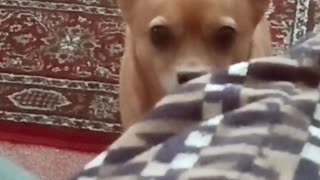 1:36
1:36
The Life and Times of TC and Boo!
4 years ago $0.15 earnedTC wants his Christmas antlers!
223 -
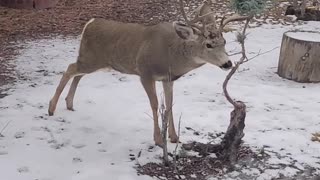 0:19
0:19
RickNau
4 years ago $0.02 earnedDeer rubbing antlers
69 -
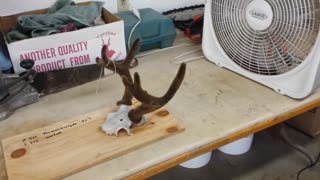 7:49
7:49
Dickstaxidermy
4 years agoCuring Velvet Antlers
53 -
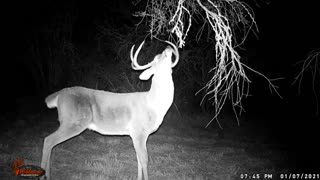 0:14
0:14
Skitx
4 years ago $0.01 earnedAntlers on the move
201 -
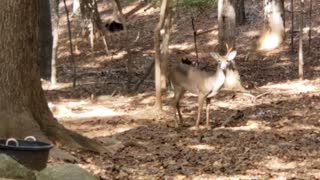 0:17
0:17
ncjoe1970
4 years ago $0.01 earnedAntlers are growing
29 -
 0:38
0:38
Buzzvideos - EN
4 years agoDog shocked at his reflection with reindeer antlers
981 -
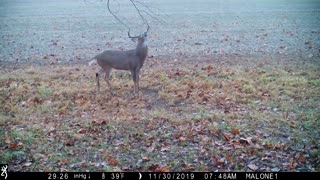 0:10
0:10
Hunting & Cycling video potpourri
4 years agoBuck making his rounds
75 -
 0:20
0:20
CTAKAH
4 years agoAdorable Retriever In Reinder Antlers
82 -
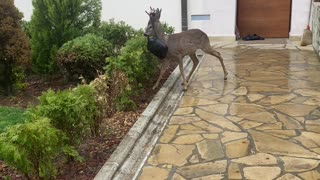 0:08
0:08
ViralHog
4 years ago $0.01 earnedHandbag Dangles From Deers Antlers
385 -
 0:10
0:10
Sportsman Lifestyle
4 years agoyoung buck scratching his neck
158

13 Comments